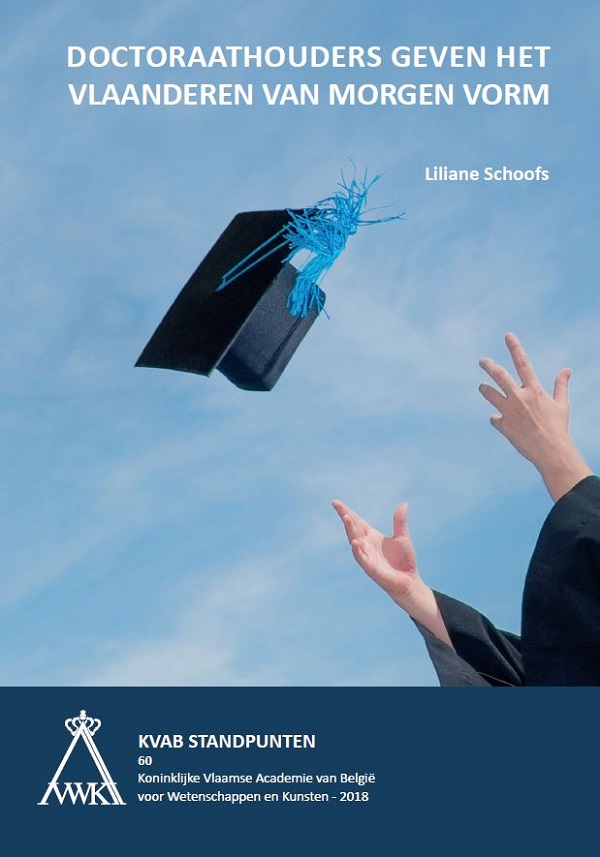Doctorate holders are shaping the future of Flanders

The number of doctorate holders in Flanders has more than doubled in the
last decade. This was a conscious decision by the Flemish Government, as
a result of the Europe 2020 strategy and on the advice of various
consultancy bodies, to encourage the flow of knowledge between
high-skilled researchers from the universities and the non-academic
labour market. The government’s ambition to give the Flemish knowledge
economy a real boost has been successful. Flemish doctorate holders,
including those from the Humanities, are in great demand on the labour
market and are handsomely remunerated.
There is currently a
widespread misconception that a PhD must only be undertaken in
preparation for an academic career. Next-generation PhD researchers
undergo broad and multidisciplinary training to become neo-generalists
who not only have discipline-specific knowhow but can also master a
whole range of universal skills. The average PhD student is a healthy
mix of researcher, coach, technician, writer, marketer, communicator and
negotiator. In fact, the PhD student of the 21st century is an
all-rounder, at home in all markets. Perseverance and the ability to
deal with failure are skills that characterise all PhD researchers. And
these combinations of skills are not only useable, they are also
indispensable in various employment sectors, which means that doctorate
holders can move in different fields, even those not immediately related
to their original specialisation.
Nowadays, as far as the employment of doctorate holders is concerned,
the question is not whether Flanders will be able to attract highly
skilled individuals, but whether highly skilled individuals will choose
to work for Flemish employers. Vacancies for highly skilled workers are
not being filled because of the current limits on the number of
graduates. Today’s doctorate holders can have their pick of jobs, and
when looking for a suitable job they can also explore horizons beyond
their own discipline.
The four-year PhD programme is intensive and
cannot be further truncated. The PhD researcher cannot also be expected
to take on business internships or to start up enterprises during that
short, intensive PhD period, just because of the government’s outmoded
and unilateral focus on “useful” job-specific courses. That may be
useful for the more job-specific disciplines, but much less so for the
training of a neo-generalist. Writing a doctoral thesis is like running
a mini-enterprise. Being able to start up your own project and bring it
to a successful conclusion is therefore one of the skills that employers
both within and outside academia are looking for.
So it is vital that
the Flemish Government continues to invest in the funding and
qualitative supervision of doctorates. This supervision is coming under
increasing pressure because the number of ZAP responsible for this task
has not risen in parallel. Flemish universities are urgently in need of
additional ZAP and postdoc support staff.
The qualitative training of PhD researchers is after all essential in innovative and research-based universities. The Doctoral Schools are charged with transforming PhD researchers into creative, critical and independent researchers, by promoting a rigorous research culture and the free exchange of knowledge rather than focusing on the mechanistic box-ticking of the quality control parameters. Stimulating international mobility and building solid bridges between disciplines are major challenges for the Doctoral Schools. They can act as crucial hubs in this area and bring about a change in mentality that will make flexibility and interdisciplinary mobility between faculties, universities, sectors and regions the norm, not the exception. Universities would therefore do better to stop classifying their doctoral diplomas by discipline. The mention of the specialisation on the doctorate diploma can even be left out because doctoral research is becoming increasingly multidisciplinary.
Flanders needs to better prepare its tertiary education for the sought-after skills of the 21st century, such as analytical and problem-solving thinking, working in a team, communication skills, innovative capacity, and creativity, amongst other things. Therefore, the Flemish government needs to increase its funding of higher education, and more specifically that of doctorates, which already encompass all these 21st century skills.
Available documents
Author
-
Liliane Schoofs


